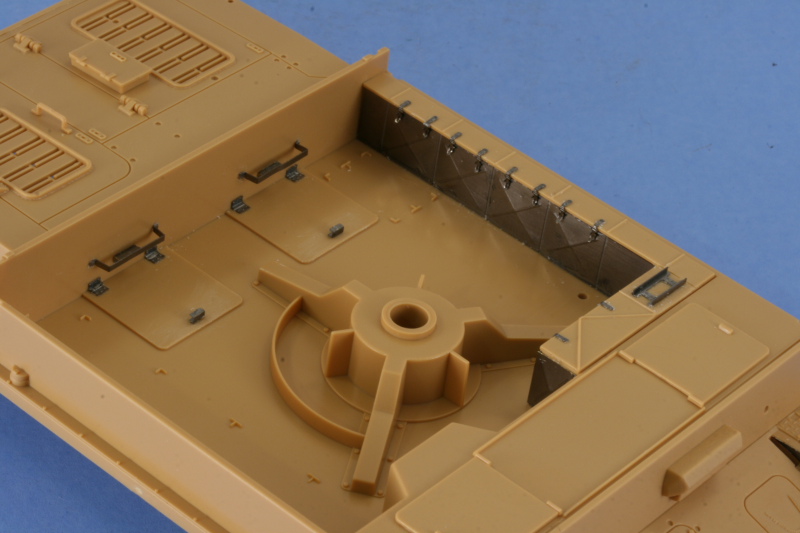Work began today on a new project, one that I've wanted to do for a while but held off on for a variety of reasons. Lion Roar's recent release of the Flak 43 3.7cm kit is what finally pushed me into the build though, so here goes.
Since this is a multi-media build and kitbash/combination exercise, the kit instructions steps will not necessarily be followed to the letter. I started with the lower hull and suspension first, installing the bogies, bump stops and final drive housings as called for in Steps 1 and 3 but left off the return rollers for the time being.

The rear hull plate had it's various elements installed and I used the Eduard PE items to replace the fuel filler cap since it included the retaining chain. The chain was given a 3-D look by carefully bending the flat links 90 degrees to each other using two pairs of tweezers and working one link at a time. PE mounts for the base of the exhaust covers were also added and the rear plate installed to the lower hull.


Next came the road wheels, return rollers, sprockets, and idlers. The kit provides the option for both the earlier welded-tube style and the later cast style idler, I opted for the later style. The sprockets include a polycap insert that will allow them to rotate freely while the idlers do not. The steel return rollers were assembled but not installed since a dry-fit shows they've got a little bit of play to their mounts and I want them to be lined up properly with the rest of the running gear, so they will get installed later on. All of the road wheel halves were removed from the sprues and sanded to remove a slight seam on the rubber portion and the outer halves received their hub caps.

Turning to the upper hull, the side air intakes were added along with the rear fenders, mud flaps, and rear deck plate. The rear deck plate required two molded-on areas originally used on earlier Pz IVs to mount tow cables to be removed, this was done using a #11 blade and carefully sanded down to match the rest of the hull.
The kit parts for the intake covers were replaced with the Eduard items and the retaining wing nuts and side hull clips added. I used Gator Glue, an acrylic binder, to mount the plates and the various parts to allow for some work time to position them properly. I also added the bolt strip detail to the top and bottom of the rear hull bracket, using liquid glue to soften the plastic and gently pressed the strip into place with the tip of a wooden toothpick.

The hull front also received some attention with the access hatches added for the driver and radio operator, the front superstructure plate installed, and details added to the front fenders and mud-flaps. The Eduard items were used here along with a short length of solder bent to shape and glued in place with CA gel to complete the Bosch headlight wiring.

Next up was the interior of the fighting compartment, I removed the simplified molded on handles for the two rear access panels and replaced them with the Eduard parts. The Eduard set included additional detail for this area including the hatch hinges and retaining clips and handles, so these were added as well.
The side ammunition bins were also installed and detailed. The top of the bin had a molded-on ladder shaped item, this was removed and replaced with the Eduard part which was bent to shape and glued in place. The ammunition bin faces are molded smooth on the Tamiya parts, so the Eduard PE faces were used to upgrade this area. The reinforced "X" patterns were created using the point of a wooden toothpick and a piece of hard, but flexible, rubber matting to allow the "X" to be embossed on the outer surface. Eduard allows for this with the inner faces having the X pattern already etched and recommend using a ball-point pin to do this but I've found the toothpick provides a more reliable and consistent pattern and used that instead. Each of the bins received 2 latches which were carefully bent to shape using tweezers and a magnifier and installed with Gator Glue to allow for proper positioning.

Rounding things out for the time being, the lower and upper hulls were joined using regular glue to get a good solid bond. Additional details were then added to the hull including the front Bosch light and "d"-shaped flap support, brake housing vents, rear side grab handles, front tow pintles and spare track holder, and the rear antenna mount.

Next up will be the side walls for the fighting compartment, the kit allows for 3 different modes (full transport, AA only, AA and ground) for the plates and I'll have to study that carefully to determine the placement and use of the various Eduard items to create those details.

















































